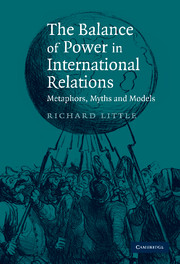Crossref Citations
This Book has been
cited by the following publications. This list is generated based on data provided by Crossref.
Mayer, Hartmut
2009.
Declining might in the limelight: European responses to new regional powers.
South African Journal of International Affairs,
Vol. 16,
Issue. 2,
p.
195.
Mccourt, David
2009.
Securing Waltz's Legacy?.
European Political Science,
Vol. 8,
Issue. 4,
p.
451.
van de Haar, Edwin
2009.
Classical Liberalism and International Relations Theory.
p.
125.
Eilstrup-Sangiovanni, Mette
2009.
The End of Balance-of-Power Theory? A Comment on Wohlforth et al.'s `Testing Balance-of-Power Theory in World History'.
European Journal of International Relations,
Vol. 15,
Issue. 2,
p.
347.
Cerny, Philip G.
2010.
Rethinking World Politics.
p.
64.
Cerny, Philip G.
2010.
Rethinking World Politics.
p.
270.
Cerny, Philip G.
2010.
Rethinking World Politics.
p.
289.
Cerny, Philip G.
2010.
Rethinking World Politics.
p.
245.
Cerny, Philip G.
2010.
Rethinking World Politics.
p.
157.
2010.
Rethinking World Politics.
p.
vii.
Cerny, Philip G.
2010.
Rethinking World Politics.
p.
24.
Scheuerman, William E.
2010.
The (classical) Realist vision of global reform.
International Theory,
Vol. 2,
Issue. 2,
p.
246.
Van Langenhove, Luk
2010.
The Transformation of Multilateralism Mode 1.0 to Mode 2.0.
Global Policy,
Vol. 1,
Issue. 3,
p.
263.
Cerny, Philip G.
2010.
Rethinking World Politics.
p.
128.
Cerny, Philip G.
2010.
Rethinking World Politics.
p.
111.
Cerny, Philip
2010.
Rethinking World Politics.
Cerny, Philip G.
2010.
Rethinking World Politics.
p.
217.
Cerny, Philip G.
2010.
Rethinking World Politics.
p.
175.
Cerny, Philip G.
2010.
Rethinking World Politics.
p.
40.
Cerny, Philip G.
2010.
Rethinking World Politics.
p.
85.



